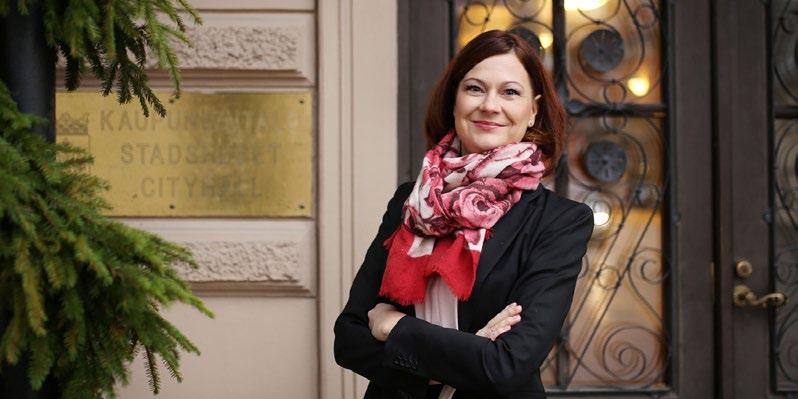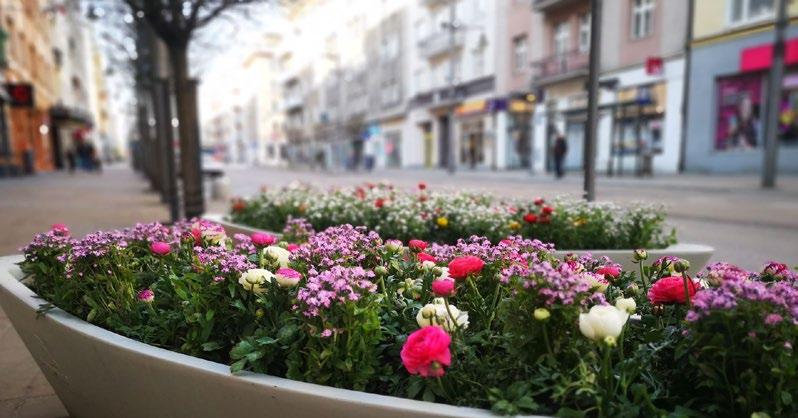
4 minute read
The most environmentally friendly car and passenger ferry in the world – Aurora Botnia
The cities, Vaasa in Finland and Umeå in Sweden, on both sides of the Kvarken straight have set clear environ-mental targets: Umeå with the local Agenda 2030 programme, and the ambition of the city of Vaasa to become climate neutral by 2035.
Advertisement
The ferry company Wasaline, owned by the two cities, has set its own targets for environmental contribution to complement these strategies. Therefore, a brand new ferry Aurora Botnia is being built by RMC in Rauma, Finland, commissioned by Kvarken Link. It is a modern ship with 2 cargo decks that will accommodate around 800 passengers and has a freight capacity of 1,500 lane meters for trucks and cars.
The vessel will be designed to be environmentally friendly, with a machinery running on a dual fuel and battery solution. The main source of fuel is liquefied natural gas, LNG. The vessel will also be able to utilise biogas. Instead of lifeboats, Aurora Botnia will utilise two evacuation systems as safety equipment, that can be launched from the deck of the ship. The systems are based on an evacuation chute and an automatically inflatable liferaft. Aurora Botnia, which will be completed this spring, will daily operate a route between Vaasa and Umeå. This is the first new build ship for this route ever, even though there have been ferries operating this route since the 1940’s. The ship will be the most environmentally friendly car and passenger ferry in the world. It will also be a great showroom for the innovations and world class knowledge that can be found within the Vaasa energy cluster. For more details see: Home – Kvarken Link (wasaline.com)
The tourism industry, as part of the global economy, will grow once travelling is back to normal again. Sustainable travel options will be needed and therefore, Finland and Vaasa as a destination are taking steps towards pursuing a more sustainable way of providing travel services. This includes integrating future trends and sus-tainable modes of travelling, sustainable accommodation and other services.
The Vaasa region has every possibility to be a forerunner in this work with the brand new ferry as well as our regional interest in innovative projects involving electrical aviation solutions. Visit Finland and Visit Vaasa will together provide concrete tools for this job to all our interested businesses within the tourism sector.
by Catarina Fant| catarina.fant@wasaline.com Laila Schauman | laila.schauman@visitvaasa.fi Susanna Slotte-Kock| susanna.slotte-kock@vaasa.fi
BERGEN UMEÅ
VAASA
JYVÄSKYLÄ
SÖDERHAMN
GÄVLE
ÖREBRO MARIEHAMN PORI
TURKU
ESPOO LAHTI
PORVOO KOTKA
HELSINKI
RAKVERE
TALLINN
ARENDAL LINKÖPING
KRISTIANSAND
VISBY
VÄXJÖ
AARHUS KALMAR
KARLSKRONA MALMÖ
KOLDING
NÆSTVED
TRELLEBORG
GULDBORGSUND BERGEN AUF RÜGEN
KIEL ROSTOCK GREIFSWALD REDA
USTKA DARŁOWO
MIELNO GDYNIA
SOPOT SŁUPSK GDAŃSK
KOSZALIN PRUSZCZ GD.
HAMBURG PÄRNU
TARTU
ELVA
VALMIERA CĒSIS
LIEPĀJA
RIGA JŪRMALA
JELGAVA JĒKABPILS
PALANGA KLAIPĖDA
GARGŽDAI
TAURAGĖ ROKIŠKIS
PANEVĖŽYS
KAUNAS JONAVA
ELBLĄG ST. PETERSBURG
PRESIDENT OF THE UNION OF THE BALTIC CITIES Mantas Jurgutis, City Hall, Laisves Al. 96, LT-44251 Kaunas, Lithuania Tel. +370 62703246, mantas.jurgutis@kaunas.lt
VICE-PRESIDENTS OF THE UNION OF THE BALTIC CITIES Elina Rantanen, City Hall, Yliopistonkatu 27a, PB 355, FIN-20101 Turku, Finland elina.rantanen@turku.fi
Piotr Grzelak, City Hall, Nowe Ogrody 8/12, PL-80803 Gdańsk, Poland Tel. +48 693380120, piotr.grzelak@gdansk.gda.pl
Vyacheslav Kalganov, City Hall, Smolny, RU-193060 St. Petersburg, Russia Tel. +7 8125766171, kalganov@kvs.gov.spb.ru
Jørgen H. Kristiansen, City Hall, Radhusgata 20, Postuttak, N-4604 Kristiansand, Norway Tel. +47 92468673, jorgen.kristiansen@kristiansand-bystyre.no
MEMBER CITIES OF THE EXECUTIVE BOARD
Elva, Gdynia, Kemi, Kolding, Liepāja, Panevėžys, Rostock, St. Petersburg, Umeå
UBC – working together to foster sustainable, smart and safe cities
Union of the Baltic Cities (UBC) is the leading network of cities in the Baltic Sea Region with the members from all ten Baltic Sea countries. Founded in 1991 in Gdańsk, UBC is a voluntary, proactive network mobilizing the shared potential of its member cities for a safe, smart and sustainable Baltic Sea Region. The UBC cooperates with numerous Baltic and European organisations.
The UBC’s practical work is carried out through active cooperation of the member cities in seven thematic Commissions: Cultural Cities, Inclusive and Healthy Cities, Planning Cities, Safe Cities, Smart and Prospering Cities, Sustainable Cities, and Youthful Cities. The Commissions coordinate and execute specific projects, activities and events.
In addition to the Commissions, significant work is carried out in the UBC Task Force on Youth Employment and Well-being, UBC Working Group on Gender Equality and UBC Communications Network.
Any coastal city or any other city interested in the development of the Baltic Sea Region may become a member of the UBC – please contact the UBC Secretariat.
www.ubc.net


UBC TURNS 30 THIS YEAR – TAKE PART IN A PHOTO COMPETITION
As part of the jubilee year, UBC member cities and commissions are invited to join a photo contest with the topic “Our member Cities and Citizens”.
The photos should be of good quality (resolution 300 pixels) and sent by 30 September to: irene.pendolin@ubc.net.
When sending the photo, please inform: • The name or theme of the photo • Person(s) in the photo – please remember to ask for consent from the person(s) due to GDPR regulations • Photographer’s name • Your city’s name
The four finalist photos, chosen by the UBC Presidium, will be presented at the UBC XVI General Conference, to be organised 27–30 October in St. Petersburg.










